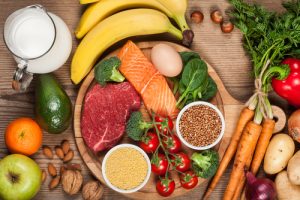As women begin to enter their late 30s and 40s their bodies may begin to enter a stage called perimenopause. During this time, the female body will begin to change and a woman’s diet should be adjusted accordingly to give her as much nutrients and support as possible. Perimenopause literally translates to “around menopause.” This is the stage where the body prepares itself for menopause. This decline in female reproductive hormones is both natural and normal. This big change does not have to be uncomfortable for women, especially if they encourage their body to adapt by adopting the perimenopause diet guidelines. Making some dietary adjustments can help to support the female body as it enters a totally new stage of life. Many aspects of the perimenopause diet can help mitigate or avoid any adverse symptoms a woman might begin to experience when she starts to enter this new phase.
Signs of Perimenopause
The perimenopause phase can last for quite a while before a woman is considered menopausal. Even so, during this phase, the production of hormones progesterone and estrogen begin to slow down. The hormone levels may rise and fall a bit before tapering off and making their final descent into menopause. Some of the most commonly reported signs of perimenopause include:
- Mood changes
- Vaginal changes
- Irregular periods
- Hot flashes
- Sleep difficulties
- Changes in sexual function
Principles of the Perimenopause Diet
Though women may be in perimenopause for up to a decade before entering menopause, prevention is key and lifestyle changes may very well help you in the long run. Here is the basis of the perimenopause diet:
 Things to Eat More of
Things to Eat More of
Fatty fish
Wild-caught fish, like Alaskan salmon, are known to be chock-full of omega-3 fats, vitamin D and astaxanthin. Omega-3s will help keep inflammation at bay within the body, while vitamin D is a fat-soluble vitamin that is required for strong bones. Since osteoporosis is a risk for those with declining estrogen levels, incorporating this food into your life might not be a bad idea.
Protein
The female body will need a bit more protein during this time, as it will naturally begin to lose muscle mass. Protein is also essential to hormone regulation. Regulating your hormones may also support appetite suppression and healthy blood sugar levels. According to this clinical study, you will want to continue eating enough protein even after menopause.
Calcium
Women with declining estrogen levels are at an increased risk for osteoporosis. This fact sheet describes the need for increased calcium as women age. After 50, it is recommended women get 1,200mg of calcium each day. Dairy is not the only way for you to get your calcium. This vital mineral can be abundantly found in leafy greens and broccoli.
Fiber
Getting a high amount of fiber by consuming organic vegetables will help you as you journey into perimenopause. Fiber has anti-aging effects as well and can even decrease your risk of heart disease or cancer.
It is also important that you keep drinking water. Hormone fluctuations can lead to increased bloating and water retention. More water will actually decrease these negative effects and even keep gas at bay.
There are also some things you are going to want to avoid in perimenopause in order to keep your body at its very best and strongest.
 Things Best Avoided During Perimenopause
Things Best Avoided During Perimenopause
Junk food
The body will already be stressed enough as it tries to find balance with its new changes. Eliminating junk food containing sugar and high-refined carbs will be a great start to this new phase in life. Eating junk food also increases your risk of heart disease. All the more reason to avoid it.
Alcohol
Alcohol raises inflammation levels and even affects your hormones. If you are going to drink alcohol, limit yourself to no more than one glass per day.
Caffeine
Caffeine actually increases some women’s chances of experiencing hot flashes symptoms. One cup of green tea or coffee will not hurt you from time to time, but it is best not to overdo it.
Adopting a healthy perimenopause diet plan and being physically active can help support you as you transition into this new period of life.

 Things to Eat More of
Things to Eat More of Things Best Avoided During Perimenopause
Things Best Avoided During Perimenopause



